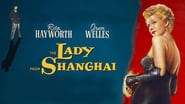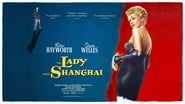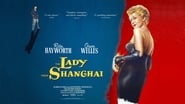dick_tater
I was impressed with the way the Bannister character walked, with the two canes, especially in the courtroom scenes. Was Sloane paralyzed, or did he take on this walking style just for this movie? I saw nothing in the bio on Sloane to indicate he was paralyzed. I just watched this on TCM...I found it to be a rather typical Wells's movie...even saw some similarities with The Third Man-the lack of clarity as to who was who, and who was guilty. But, overall I found it to be quite good. I even kinda liked Wells's accent, although I agree with others that it did not seem totally accurate. I would recommend this movie, along with the third man.
atlasmb
"The Lady from Shanghai" is a hybrid--a combination of the artistic vision of director Orson Welles and the more pragmatic vision of the studio, which altered almost every portion of the film. It is also an unlikely success, but sometimes films come together despite their mishaps and disparate elements--"The Wizard of Oz" comes to mind.Reading the trivia notes in IMDb about the film, one would have to say that the odds were against TLFS being a consistent and successful entity, but somehow it became a wonderful piece of art noir.Starring Rita Hayworth as Elsa Bannister, the beautiful wife of a very successful but bitter attorney played by Everett Sloane, the story is told by central character Michael O'Hara (Orson Welles), a tough but vulnerable seaman with a fatalistic point of view. He immediately falls for Mrs. Bannister and is drawn into the web of their dysfunctional relationship. Glenn Anders plays George Grisby, Bannister's partner, with a brilliantly off-kilter and manic intensity.The cinematography is beautiful, giving the brightest objects the darkest shadows. The scenery is spectacular--from the shots over the city of San Francisco to the glittering scenes of Acapulco.Though the storyline is convoluted, it holds up. The film is really a mystery about the true nature of Elsa, but it hinges on a point of law (like "Double Indemnity") that is questionable, but irrelevant in the biggest scheme of things.Welles' decision to cut and color the luscious locks of his estranged wife Hayworth was severely criticized at the time, but for my money it gives her a look that is more severe, more dangerous, more inscrutable--but just as beautiful--adding to her mystery. The courtroom scene (with its comic elements) is also often criticized, but the viewer is not supposed to laugh. It adds to the farcical nature of the film. O'Hara always feels like the gods are laughing at him, so it is appropriate that the procedure that will determine his fate feels less than serious. The film ends with the famous hall of mirrors scene, where all is explained. And the viewer is left with the impression that he navigated a crazy house of illusions and--like O'Hara--became victim to his own nature. It is a stylistic classic that retains at its core the markings of a genius.
Edgar Allan Pooh
. . . as he's the miscast "man in the background outside the Cantina" guy, when he SHOULD be playing the part of the foolish sailor, "Michael O'Hara." Unfortunately, THE LADY FROM SHANGHAI suffers from the same flaw that would later hamper the picture ROCKY: Writer's Blockhead. Sylvester Stallone thought just because he wrote the ROCKY story, that somehow entitled him to portray the title boxer character himself. If he could have worked through this hubris, his idea could have become a more successful film starring an accomplished actor as ROCKY, such as Robert De Niro or Bruce Dern. Similarly, Aussie Flynn's Irish brogue surely would have been more convincingly foreign than that of Orson Welles. And since Mr. Welles just has Michael standing by idly during the Shoot-out at the O.K. Funhouse, Errol clearly would have ad-libbed some bit of Swashbucklery to enliven the proceedings. Furthermore, Errol was too much of a gentleman to allow Rita Hayworth's character to die alone (wife or no wife in Real Life). But what else could you expect, knowing how these two blokes met their historical ends? Errol became the actual ROBIN HOOD, leading Castro's boys to Victory in Cuba (and getting bumped off by the CIA Black Ops guys for his success). Welles occasionally waddled on set to make TV ads for some of the products he favored during his fatal case of gluttony. Elvis may have died in his john with a fried peanut butter and banana sandwich at hand, but at least The King wasn't whimpering about some old sled!
classicsoncall
If you like your noir with a little Latin beat, this could be right up your alley. The title is a bit of a misnomer though, since 'The Lady', Elsa Bannister (Rita Hayworth) wasn't from Shanghai, she just happened to be there once. If I hadn't heard all the caveats from the reviewer who introduced the picture on Turner Classics, I wouldn't have considered it to be a 'flawed' picture. Apparently producer Harry Cohn who financed the thing had a lot of problems with the finished film, and had Orson Welles re-shoot a lot of the scenes with Hayworth to feature her glamorous side, hence all the steamy close-ups. Welles was married to Hayworth at the time even though the marriage was kaput, so watching both of them get passionate on screen must have been a real exercise in acting effort.You might need to catch the story a couple of times to figure out the murder plot, but it's all spelled out by the principals - Grisby (Glenn Anders) killed Broome (Ted de Corsia) when Broome discovered the plan to kill Arthur Bannister (Everett Sloane) and frame Michael (Welles) for the murder. Elsa (Hayworth) killed Grisby once she knew Michael had written the confession, but that left her husband still alive to represent Michael as the world's greatest criminal attorney. The fun house mirror maze would have worked out fine for Elsa if she and Arthur hadn't shot each other, but I guess you can't have everything.The schlub in the story was Michael, but he knew that all along. He inadvertently managed to follow the premise he offered at the start of the picture - "One who follows his nature keeps his original nature in the end". Apparently so did all the rest, managing to fulfill their nature as sharks, mad with their own blood.
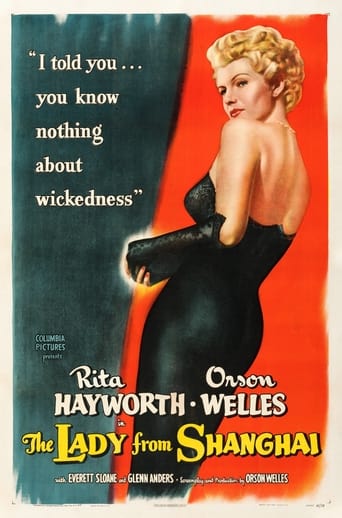
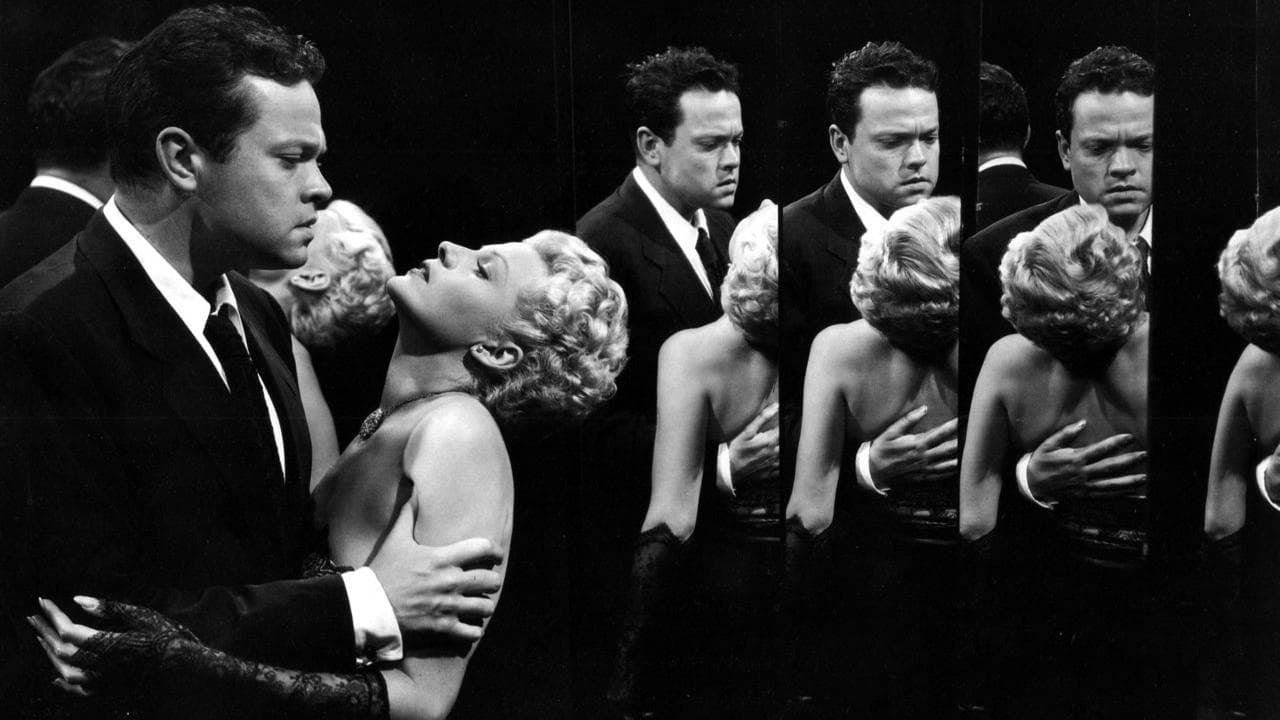

 AD
AD




